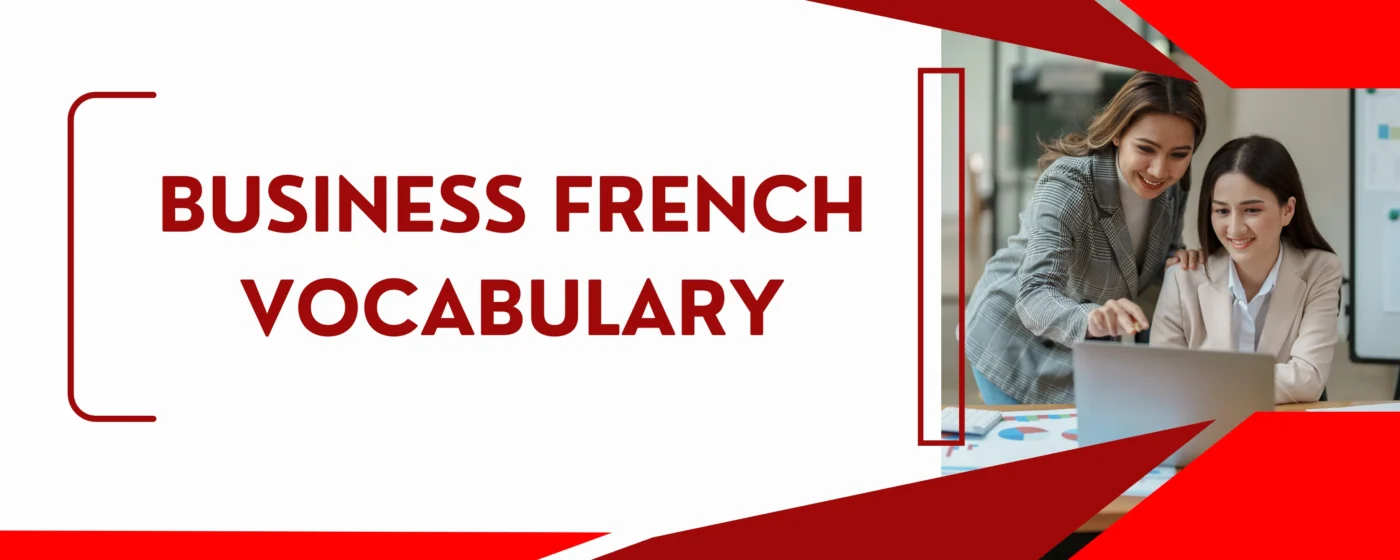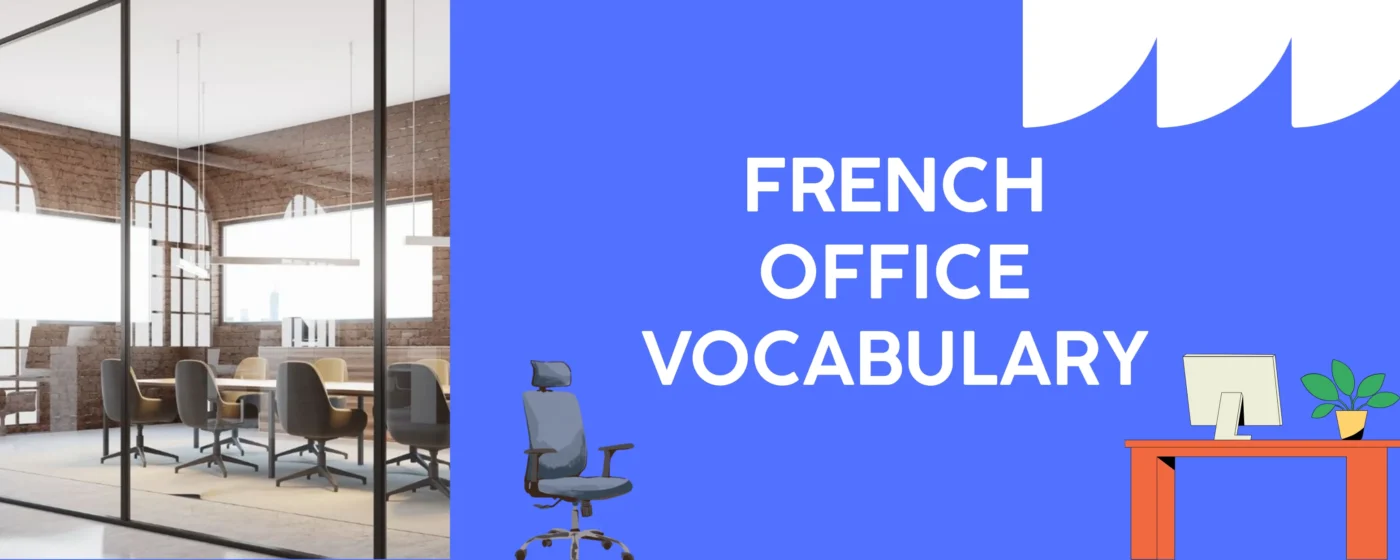Unlike common opinion, French fluency isn’t just for ordering the usual coffee and croissants. It can take you places! It can be your key to lock business deals with big companies or turn awkward mergers into happy partnerships between two companies. So what’re you waiting for? Come, let’s dive into the world of business French vocabulary to level up your chances of a promotion at the next office meeting!
Key Takeaways
- Understand the job titles such as directeur (director) and business terms such as contrat (contract) is crucial in the workplace.
- There are some phrases for learning like réunion (meeting) enhance professionalism which are use in formal greetings and clear communication in meeting.
- Learn company structure vocabs such as service marketing (marketing department) helps navigate French businesses.
- Learn the politeness and cultural etiquette including format address and greetings along with skill for job interviews like discussing points forts/faibles (strengths/weaknesses), improve chances of success.
- You have to learn the business emails and phone call phrases fosters smooth workplace interactions.
Business French Vocabulary: What’s Your Job? Tell Us in French
A formal professional introduction should always begin with a greeting (Bonjour/ Bonsoir), followed by your name (Je m’appelle…), and job title (Je suis…chez…). Don’t know how to talk about your designation? Here’s a couple French words to talk about your job role and title properly:
| French Word | English Translation | Example |
|---|---|---|
| Directeur/Directrice | Director | Le directeur financier a présenté le budget annuel. (The financial director presented the annual budget.) |
| Ingénieur(e) | Engineer | L’ingénieure civile a supervisé la construction du pont. (The civil engineer supervised the bridge construction.) |
| Responsable des ventes | Sales Manager | Le responsable des ventes a atteint ses objectifs trimestriels. (The sales manager reached their quarterly targets.) |
| Chef de projet | Project Manager | La chef de projet a coordonné les différentes équipes. (The project manager coordinated the different teams.) |
| Comptable | Accountant | Le comptable a préparé les états financiers. (The accountant prepared the financial statements.) |
| Assistant(e) de direction | Executive Assistant | L’assistante de direction a préparé les documents pour la réunion. (The executive assistant prepared the documents for the meeting.) |
| Spécialiste en marketing | Marketing Specialist | Le spécialiste en marketing a lancé une nouvelle campagne publicitaire. (The marketing specialist launched a new advertising campaign.) |
| Consultant(e) | Consultant | La consultante a réalisé une étude de marché approfondie. (The consultant conducted an in-depth market study.) |
| Avocat(e) | Lawyer | L’avocat a rédigé le contrat de vente. (The lawyer drafted the sales contract.) |
| Développeur/Développeuse | Developer | La développeuse a amélioré la performance du site web. (The developer improved the website’s performance.) |
| Comité de direction | Executive Committee / Management Committee | Le comité de direction s’est réuni pour discuter de la nouvelle stratégie. (The executive committee met to discuss the new strategy.) |
Expand your vocabulary by exploring various professions in French through this engaging guide that simplifies job-related terms and usage.
Business Words and Phrases
Here are 10 common business-related words and phrases you can make use of in your next office meeting. Learning French business vocabulary is essential for effective professional communication, business etiquette, and understanding cultural nuances when working with French companies or clients.
Below is a vocabulary list of essential business terms:
| French Word/ Phrase | English Translation | Example |
|---|---|---|
| Entreprise (term for a French company) | Company | L’entreprise a annoncé une nouvelle stratégie. (The company announced a new strategy.) |
| Contrat | Contract | Nous devons signer le contrat avant vendredi. (We need to sign the contract before Friday.) |
| Chiffre d’affaires | Turnover | Le chiffre d’affaires de l’année dernière a augmenté. (Last year’s turnover increased.) |
| Faire affaire avec | To do business with | Nous aimons faire affaire avec cette entreprise. (We like to do business with this company.) |
| Marché | Market | Le marché est très compétitif. (The market is very competitive.) |
| Rendez-vous | Appointment/ Meeting | J’ai un rendez-vous avec le directeur à 15h. (I have a meeting with the director at 3 PM.) |
| Négociation | Negotiation | La négociation a été difficile, mais nous avons trouvé un accord. (The negotiation was difficult, but we reached an agreement.) |
| Investissement | Investment | Cet investissement devrait rapporter des bénéfices importants. (This investment should yield significant profits.) |
| Bénéfice | Profit | L’entreprise a réalisé un bénéfice record cette année. (The company made a record profit this year.) |
| Stratégie | Strategy | Quelle est votre stratégie pour l’année prochaine? (What is your strategy for next year?) |
Company and Workplace
In the French business world, understanding the structure and terminology of companies is key. The word “entreprise” or “société” refers to a company, but there are several types you might encounter. For example, “une société par actions” is a joint stock company, while a “société à responsabilité limitée” is a limited liability company. These distinctions are important when discussing business in France or working with French companies.
Within the workplace (“le lieu de travail”), you’ll interact with various departments such as “la comptabilité” (accounting department), “le service marketing” (marketing department), and “les ressources humaines” (human resources). Each department plays a vital role in the daily operations of a company. Key figures in the French corporate world include “le patron” (the boss), “le chef” (the manager), and the “président directeur général” (CEO). Knowing these terms and their functions will help you navigate the business environment, whether you’re working in a small business, a medium sized business, or a large corporation.
Coworkers and Meetings
Here’s some vocabulary for office settings and interactions with colleagues. French people typically value professionalism and clear communication during meetings and in the workplace:
| French Word/ Phrase | English Translation | Example |
|---|---|---|
| Collègue | Coworker | Mon collègue m’a aidé avec ce projet. (My coworker helped me with this project.) |
| Réunion | Meeting/Business meeting | La réunion commence à 10 heures. (The business meeting starts at 10 o’clock.) In a French business meeting, it’s important to use the right vocabulary and understand professional etiquette. |
| Prendre des notes | To take notes | Je vais prendre des notes pendant la présentation. (I’m going to take notes during the presentation.) |
| Fixer un rendez-vous | To set an appointment | Nous devons fixer un rendez-vous avec le client. (We need to set an appointment with the client.) |
| Agenda | Agenda | Est-ce que vous pouvez partager l’agenda? (Can you share the agenda?) |
| Compte-rendu | Minutes (of a meeting) | Le compte-rendu de la réunion sera envoyé par email. (The minutes of the meeting will be sent by email.) |
| Présentation | Presentation | Il a fait une excellente présentation. (He gave an excellent presentation.) |
| Courriel | Je vous envoie un e-mail avec les détails. (I’m sending you an email with the details.) | |
| Salle de réunion | Conference/ Meeting room | La salle de réunion est réservée pour cet après-midi. (The meeting room is reserved for this afternoon’s business meeting.) |
| Projet | Project | Nous devons finir ce projet avant la fin du mois. (We must finish this project before the end of the month.) |
Open space office layouts are becoming more common in France, and this shift often leads to more informal communication styles among colleagues.
Business Etiquette and Culture
French business etiquette is renowned for its formality and attention to detail, especially during first encounters. When meeting business partners or colleagues, it’s customary to use formal titles like “Monsieur” or “Madame” and address others with the formal “vous” until invited to switch to “tu.” Greetings are important—start meetings with a polite “Bonjour” (good morning) and end with “Au revoir” (goodbye).
Cultural nuances also play a significant role. For example, “la bise” (cheek kisses) may be used in some business contexts, though a handshake is more common in formal settings. When writing formal letters, the phrase “à qui de droit” (to whom it may concern) is often used. Business meetings (“réunions d’affaires”) follow specific protocols, including punctuality, a clear agenda, and the use of precise business vocabulary. Understanding these customs and using the right words and phrases will help you make a positive impression in the French business world.
Job Interview
Here’s some job interview vocabulary, which is essential for anyone preparing for job interviews in French-speaking environments:
| French Word/ Phrase | English Translation | Example |
|---|---|---|
| Points forts/faibles | Strengths/ Weaknesses | Quels sont vos principaux points forts et points faibles? (What are your main strengths and weaknesses?) |
| Pourquoi devrions-nous vous embaucher? | Why should we hire you? | Pourquoi pensez-vous que nous devrions vous embaucher pour ce poste? (Why do you think we should hire you for this position?) |
| Expérience professionnelle | Professional experience | Parlez-moi de votre expérience professionnelle. (Tell me about your professional experience.) |
| Compétences | Skills | Quelles compétences possédez-vous qui sont pertinentes pour ce poste? (What skills do you possess that are relevant to this position?) |
| Parcours académique | Academic background | Pouvez-vous me parler de votre parcours académique? (Can you tell me about your academic background?) |
| Objectifs de carrière | Career goals | Quels sont vos objectifs de carrière à long terme? (What are your long-term career goals?) |
| Motivation | Motivation | Qu’est-ce qui vous motive dans ce poste? (What motivates you in this position?) |
| Travail en équipe | Teamwork | Comment décrivez-vous votre capacité à travailler en équipe? (How do you describe your ability to work in a team?) |
| Résolution de problèmes | Problem-solving | Donnez-moi un exemple de situation où vous avez résolu un problème difficile. (Give me an example of a situation where you solved a difficult problem.) |
| Salaire | Salary | Quelles sont vos attentes salariales? (What are your salary expectations?) |
However, knowing just these words might not be enough for you to excel in a job interview. In many French job interviews, the employer or hiring manager often has the last word in the decision-making process, so it’s important to make a strong impression. You must also remember to:
- use formal greetings like Bonjour, Bonsoir Monsieur/ Madame
- speak clearly and confidently, using correct vocabulary
- show enthusiasm during the interview
Resume and Cover Letter
Applying for a job in France requires a well-prepared “CV” (resume) and a compelling “lettre de motivation” (cover letter). These documents should be tailored to the specific company (“entreprise” or “société”) and highlight your relevant skills, experience, and education using appropriate French vocabulary. It’s common to mention the type of contract you’re seeking, such as a “contrat à durée indéterminée” (open-ended contract) or a “contrat à durée déterminée” (fixed-term contract).
A strong cover letter demonstrates your motivation and suitability for the role, while also showcasing your command of business French. Using formal language and industry-specific terms can set you apart and increase your chances of being invited to a job interview (“entretien d’embauche”). Remember, attention to detail and professionalism are highly valued in the French business environment.
Explore exciting 12 career options after learning French that can boost your global job prospects in various industries and sectors.
Lost for Words? We’ve Got You!
Sign up for our courses and let our expert teachers boost your vocabulary effortlessly!
Business Calls
Here are 10 phrases and vocabulary words for handling professional calls in French:
| French Word/ Phrase | English Translation | Example |
|---|---|---|
| Allô, c’est…à l’appareil. | Hello, …speaking. | Allô, c’est Marie Dupont à l’appareil. (Hello, Marie Dupont speaking.) |
| Puis-je parler à… ? | May I speak with…? | Puis-je parler à Monsieur Dubois, s’il vous plaît? (May I speak with Mr. Dubois, please?) |
| Merci de me rappeler. | Thank you for calling me back. | Merci de me rappeler, j’apprécie. (Thank you for calling me back, I appreciate it.) |
| Je vous mets en relation avec… | I’ll put you through to… | Je vous mets en relation avec le service des ventes. (I’ll put you through to the sales department.) |
| Un instant, s’il vous plaît. | One moment, please. | Un instant, s’il vous plaît, je vérifie sa disponibilité. (One moment, please, I’ll check his availability.) |
| Pourriez-vous épeler votre nom, s’il vous plaît? | Could you spell your name, please? | Pourriez-vous épeler votre nom, s’il vous plaît? J’ai du mal à l’entendre. (Could you spell your name, please? I’m having trouble hearing it.) |
| Quel est le motif de votre appel? | What is the reason for your call? | Quel est le motif de votre appel, s’il vous plaît? (What is the reason for your call, please?) |
| Je suis désolé(e), il/elle est en réunion. | I’m sorry, he/she is in a meeting. | Je suis désolée, Madame Leclerc est en réunion pour le moment. (I’m sorry, Mrs. Leclerc is in a meeting at the moment.) |
| Voulez-vous laisser un message? | Would you like to leave a message? | Voulez-vous laisser un message, ou préférez-vous qu’il/elle vous rappelle? (Would you like to leave a message, or would you prefer that he/she call you back?) |
| Je vous remercie de votre appel. | Thank you for your call. | Je vous remercie de votre appel et vous souhaite une bonne journée. (Thank you for your call and have a good day.) |
Emails and Letters
Let’s get you set up for professional French email and letter writing:
| French Word/ Phrase | English Translation |
|---|---|
| Cher Monsieur / Chère Madame | Dear Sir/ Madam |
| Cordialement | Sincerely |
| Veuillez trouver ci-joint… | Please find attached (PFA) |
| Objet | Subject |
| Suite à notre conversation téléphonique… | Following our telephone conversation… |
| Je me permets de vous contacter concernant… | I am writing to you regarding… |
| Dans les plus brefs délais | As soon as possible (ASAP) |
| Accuser réception | To acknowledge receipt |
| Dans l’attente de votre réponse. | I look forward to your reply. |
| Je reste à votre disposition pour toute information complémentaire. | I remain at your disposal for any further information. |
Example:
Objet : Demande d’informations – Projet (Nom du projet)
Cher Monsieur Dupont,
Suite à notre conversation téléphonique de ce matin, je me permets de vous contacter concernant le projet (Nom du projet).
Veuillez trouver ci-joint le document présentant les détails du projet.
Je reste à votre disposition pour toute information complémentaire.
Dans l’attente de votre réponse.
Cordialement,
(Votre nom)
French Pronunciation and Accent
Clear pronunciation is essential for effective communication in the French business world. Mastering the correct pronunciation of business-related French words and phrases—like “s’il vous plaît” (please) and “vous pouvez répéter” (can you repeat)—will help you sound more professional and be better understood in meetings and negotiations.
To improve your French pronunciation, listen to native speakers, practice speaking regularly, and use language learning tools focused on business vocabulary. Don’t hesitate to ask, “Vous pouvez répéter, s’il vous plaît?” if you need clarification during a conversation. The more you practice, the more confident and fluent you’ll become, making your interactions in the business environment smoother and more successful.
Mastering business French will transform your daily work conversations from “ugh” to “wow”! It will help you close deals, foster new partnerships and sound more proficient and professional. So what are you waiting for? Visit La Forêt French Class and start your French proficiency journey today!
Frequently Asked Questions
1. What’s the difference between “Directeur” and “Responsable”?
Ans: While these two words are often interchangeably used, they have different meanings. “Directeur” translates to Director, implying a higher-level management role, while “Responsable” means Manager, indicating responsibility for a specific department or area.
2. How do I politely end a business call?
Ans: You can say “Je vous remercie de votre appel” (Thank you for your call). Even a simple “Au revoir” (Goodbye) will suffice.





